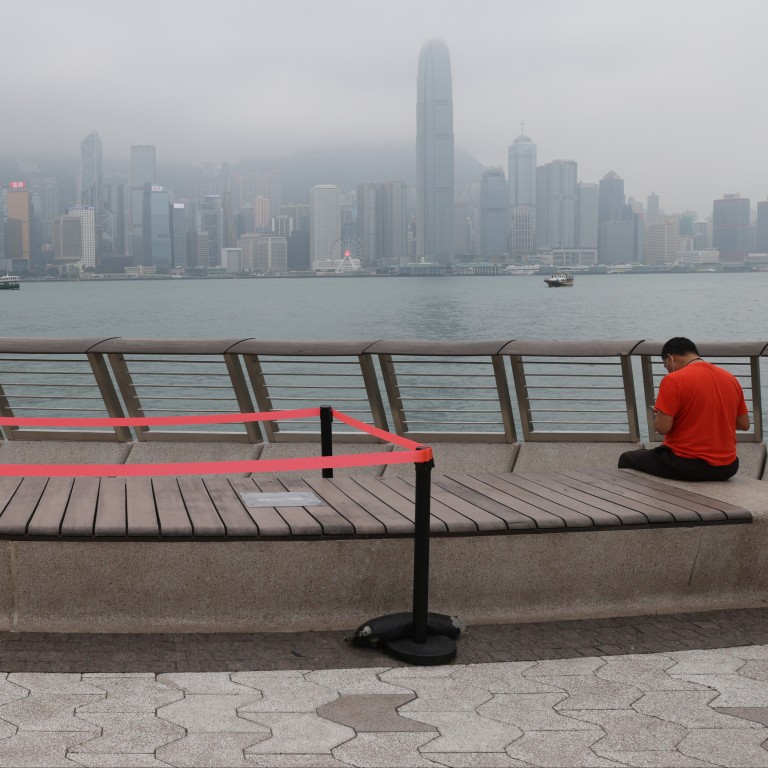
A third of international insurers may downsize their Hong Kong operations as staff head for exit amid tough Covid-19 restrictions, survey finds
- Big insurers consider relocating global and regional teams as travel restrictions make it impossible to recruit staff to replace those heading abroad
- This could undermine Hong Kong’s status as an international financial centre, says chairman of the Hong Kong Federation of Insurers
Some 30 per cent of respondents said they are thinking about relocating their global and regional teams, leaving just staff focused on the Hong Kong market.
The insurance sector is the latest to voice concerns about the “brain drain” problem, after banks, investment firms and regulators expressed similar worries in recent months.
Hong Kong, one of the largest insurance centres worldwide, has 160 insurance companies that employ some 130,000 sales agents and 30,000 other staff. HSBC Life, AIA, Prudential, Manulife are some of the biggest insurers in in the city.
The big international insurers are hardest hit by the problem, as 15 out of the 33 firms surveyed are using Hong Kong as their regional or global hub. The survey found 30 per cent of them would consider moving their global and regional team out of Hong Kong.
“Human capital is core to our industry. If they decide to move out their global and regional teams to other cities, Hong Kong’s status as an international financial centre will be impacted,” Moncreiffe said.
The Hong Kong Association of Banks said in January that local lenders face a severe talent shortage and staffing problem, as stringent quarantine and travel rules in a relentless pursuit of the city’s zero-Covid policy have deterred visitors and cut off the supply of skilled labour for replenishing the local workforce.
The Securities and Futures Commission, a financial watchdog, said it lost 12 per cent of staff last year.
Hong Kong requires a quarantine period of up to 14 days even for fully vaccinated inbound travellers, while many countries including Singapore and Britain, which have opted for living with the virus, have relaxed their rules.
HKFI plans to flag the problem with the Insurance Authority later this week and give recommendations.
Those will include a relaxation of the quarantine requirement to seven days, and allowing returning residents to be quarantined at home instead of at hotels.
“This is essential for multinational insurers to be able to continue to serve the Asia region from Hong Kong. Otherwise, it is unrealistic to expect insurers to keep their regional or global jobs based in Hong Kong,” Moncreiffe said.
The HKFI also wants to see a resumption of flights from the nine banned international destinations that include Britain, France, the US and Australia.
“This control no longer serves as a mitigation now that we have the virus in the community. The ban on flights only isolates Hong Kong from the international community,” he said.
He also called for the government to provide a clear road map of how Hong Kong will fully reopen its borders.
“Singapore, Australia and New Zealand have all given clear guidance on how and when they will reopen their borders. Hong Kong does not yet have such guidance, and until it does it will remain challenging for international capital, and international talent to invest in Hong Kong,” Moncreiffe said.
In October, nine out of 10 members surveyed by the Asia Securities Industry and Financial Markets Association said they found it difficult to operate in the city because of its restrictive Covid-19 policies, with nearly half saying they were contemplating moving staff or functions away from Hong Kong as a result.
Headhunting firms have also reported an exodus of expats from the city, and expect worse to come.
“A lot of expatriates who work in the international firms have decided to leave Hong Kong due to the travel restrictions and tough quarantine rules,” said Jerry Chang, managing director at recruiting firm Barons and Co.
“The situation will get worse this year as most other countries have opened their borders, leaving Hong Kong and mainland China to remain the only ones to keep the tough quarantine rules. This will worsen the brain drain problem, particularly the senior financial roles as they can easily find jobs back home now.”
Hong Kong’s insurance regulator is aware of the impact of the Covid-19 measures.
“The Insurance Authority is aware that while these measures are temporary and necessary, insurance corporations may have to make interim changes to their manpower deployment in Asia to sustain an effective regional operation,” a spokeswoman for the watchdog said.
“The Insurance Authority will communicate closely with all industry stakeholders, conveying their advice and concerns to the relevant government authorities where appropriate.”


